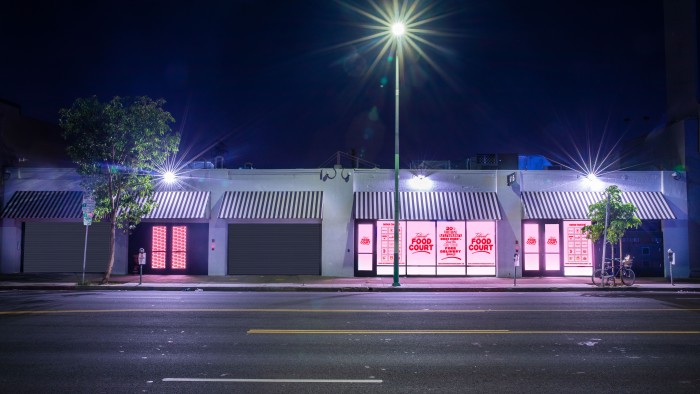The mystery of Travis Kalanick’s ‘Internet Food Court’

Roula Khalaf, Editor of the FT, selects her favourite stories in this weekly newsletter.
For a brief moment, it looked as if Travis Kalanick was back to his cunning old self with a brazen idea to capitalise on the coronavirus lockdown: an “Internet Food Court” whose key selling point was its lack of physical dining space.
A press release, sent to reporters on Monday, heralded the service — which had a soft opening last month — as being “like a mall food court, except less mall and more internet”.
Under one roof, “cloud” or “ghost” kitchens, with no other physical presence, serve up food from 30 distinct restaurant brands and distribute them via the four leading food-delivery platforms: DoorDash, Uber Eats, Postmates and Grubhub. Customers can also use a walk-up window to place and collect orders in person.
Yet on Tuesday, shortly after Mr Kalanick, formerly chief executive of Uber, was approached by the FT for further comment, the online presence for the Internet Food Court suddenly vanished.
“We don’t know how this website got constructed,” a source close to Mr Kalanick said. “Travis wants it to be very clear that this is not something he created. He’s very upset.”
Within an hour, the website was taken offline, social media posts were deleted, and the restaurants involved, which had originally appeared under one banner brand, were listed on the apps individually — removing all trace of the Internet Food Court.
City Storage Systems, which is the holding company for CloudKitchens, and majority-owned by Mr Kalanick, said the publicity push was the work of a rogue employee said to have acted above their station.

“One of CSS’s employees developed a website and press release that included numerous errors and misrepresentations,” said spokeswoman Devon Spurgeon. “It was created and disseminated without the company’s knowledge and we have launched an investigation.”
The employee declined to comment when contacted by the FT, and the company declined to comment on their employment status.
Despite Mr Kalanick’s protestations, the Internet Food Court is real: the name is emblazoned across the windows of 615 North Western Avenue, Los Angeles. Though for how long is not clear. As well as the rogue website and press release, the company told the FT it is investigating the very creation of the brand itself, including the commissioning of award-winning LA-based graphic designer Ryan Haskins. When reached by the FT, Mr Haskins said he was not able to discuss the project.
The location is a departure from the company’s usual strategy of acquiring property in mostly undesirable, cheaper areas — such as one site situated under a freeway in San Francisco. The ghost kitchen business model is built on the premise that, when listed on apps among brick-and-mortar local restaurants, the brands are largely indistinguishable from traditional restaurants, but are able to operate with lower overheads.
The Internet Food Court’s styling boldly did away with the white lie, making its factory set-up part of the appeal. On a now-deleted Instagram profile, posts included slogans such as: “All your favs in one place” and “Thai. Indian. Chinese. Russian. Errrrthang”. In a nod to the intended audience, it says the food is for everyone “except Karen”, a play on a meme popular with Generation Z — people born in the mid to late 1990s.
But the timing of the opening, with the state of California having been locked down since March 20, appears coincidental. The company obtained its liquor licence for the Hollywood site in February, according to documents uncovered by food industry blog Hngry, though the process had been in the works since at least the middle of last year. The approval notes the hopes of a local neighbourhood group that a walk-up window for the public to place orders could “activate or enliven the street”.
The walk-up window is currently out of action for the public due to coronavirus-related restrictions. Social-distancing markers have been put in place to aid drivers in keeping apart — though onlookers said the guidance was only sporadically observed.
City Storage Systems has been steadily building its network of ghost kitchens around the world, with investments and acquisitions in the UK, South Korea, India and China. Since departing Uber’s board at the end of last year, speculation has mounted that Mr Kalanick would use his new freedom as a chance to compete with his old company by launching a food delivery service of his own — a move that could improve the margins of his tenants by reducing commission costs on orders, which can sometimes be as high as 30 per cent.
However two sources familiar with Mr Kalanick’s thinking suggest he has little desire to launch his own delivery platform, instead remaining focused on investments in real estate and growing restaurant partnerships.
Comments